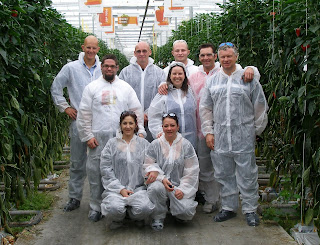Tuesday the 26th of July was spent touring a variety of growers in the Westland area of the Netherlands. The Westland is well known as the Glasshouse capital of the world housing over 3000 glasshouses.
Because of then need to respect individual growers hygiene protocols, there was a
requirement on the grower visits for us all to wear Tyvek suits, plastic overboots, gloves, and on some visits, hair nets. So as you can see by the following photos, we duly followed the rules and donned the appropriate gear!
Today also saw us adopting a new mascot. 'Ali' - the boxing glove look alike Aubergine - was 'scored' at one of our visits and is now set to accompany us on all of our adventures. However, he will not be able to accompany us back to Australia, so his fate has yet to be decided.
Vanessa and 'Ali'
Our tour today was facilitated by Pierre Grootscholten, who gave us an excellent insight in to the industry contained within the Westland area, and our transport was provided by De Roo - quite apt considering that we are an Australian touring party!
The following individual student reports will give you an insight in to today's activities.
Today we visited Os Roses within the Westland district of the Netherlands just outside Delft.
Os Roses is one of only two growers within the Netherlands of the cultivar rose; Taleah.
Taleah
The roses are grown in Grodan and foliage on the plants is bent over encourage photosynthesis in the plants, allowing the glasshouse to produce up to 35,000 stems per day. The need to ensure the roses are consistent in appearance and quality is required before being on sold at the market. Each staff member takes pride in their allocated section of the glasshouse and each rose rests in the cold store at 2 in the dark prior to being sold at market to ensure maximum water uptake by the cut flower to extend shelf life. There is a semi-automatic production line to cope with their production capacity,
Comments by Catherine Ashton
Today we went to the Duijbesteijn sweet pepper glasshouse which is run by two brothers. The crop is grown under under 65,000 square metres of glasshouse.
The glasshouse has an automated trolley system that automatically takes the Peppers from the picking area to the packing shed.
Recycling up to 8 million litres of water annually, the drain water is tested weekly with the results returning in one day so that it is possible to program the computer to re dose the recycled water of 30% and fresh water of 70% accurately. Part of the tour took us around the irrigation dosing plant.
A and B tanks
The glasshouse is designed for maximum production output, even so much so that the cafeteria is in the centre of the crops enabling staff to reach their designated break area in the shortest time where other glass houses have the break areas at the front of the glasshouse.
Comments by Kylie Rowe
Today we visited the Van Boxtel cucumber company. This facility was 3.5 hectares and is a family owned business that has spanned three generations.
Once again we had to don the fashionable hygiene suits, booties, gloves and hair nets to comply with the hygiene protocols.
The grower had suffered in the wake of the recent health scare across Europe in relation to the rumoured spread of E coli in cucumbers. It seems that the media had caused this health concern which was turned out not to be accurate. This saw a total fall in demand for cucumbers and of course very low prices.
Van Boxtel’s took the decision to pull out their crops at this time and replant in an effort to recapture their market.
The crop we saw was the youngest of all the crops and was at a two month stage so no saleable product was visible.
The Cucumbers are a smaller grown crop than capsicums are will be kept at a 21 leaf stage. This ensures quality and uniformity. The crop is approx 1200mm in height.
Because of its height, the crop is quite easy to manage with reduced labour costs.
Comments by Wayne Hobson













No comments:
Post a Comment